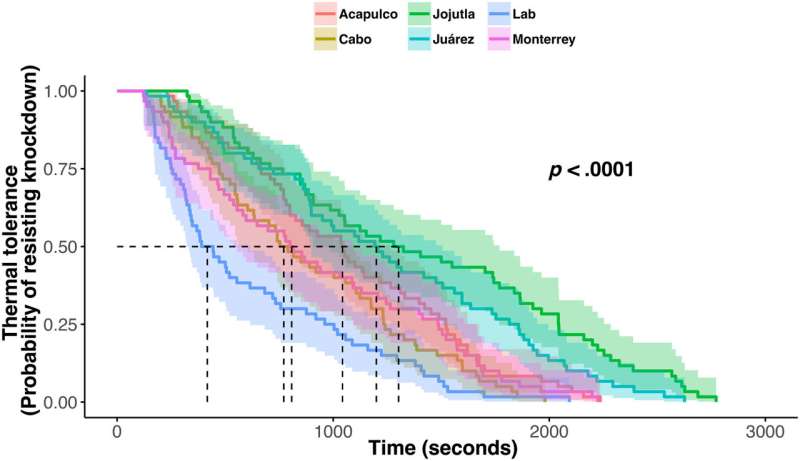This article has been reviewed according to Science X's editorial process and policies. Editors have highlighted the following attributes while ensuring the content's credibility:
fact-checked
trusted source
proofread
Unlocking the heat in mosquito modeling: Exploring disease transmission under climate change

Thermal adaptation is the ability of organisms to adjust their life history traits as the temperature changes. In the case of mosquitoes, these traits can determine their risk of transmitting mosquito-borne diseases and how this risk might change in the future as they respond to climate warming.
"Global drivers such as transport, trade and climate change, are altering the distribution of mosquitoes around the planet and, with this, comes shifting patterns of disease risk," said Matthew Thomas, a UF/IFAS professor and UF/IFAS Invasive Science Research Institute (ISRI) director.
In the study, "Phenotypic adaptation to temperature in the mosquito vector, Aedes aegypti," published in the journal Global Change Biology, a team of scientists including some researchers at the Invasive Science Research Institute, examine a critical aspect often overlooked in models that examine the impact of climate change on mosquito-borne diseases.
Many models don't take into account the potential influence of thermal adaptation in mosquitoes.
"It is well accepted that temperature affects mosquito biology, but the implications for disease transmission are still not well understood," said Thomas.
The authors contend that if mosquitoes undergo thermal adaptation in their local environments, it could lead to variation in how different populations respond to temperature. Models that take a uniform approach, a "one-size-fits-all" method, might not accurately represent the diversity of responses among different mosquito populations. Additionally, these models may fail to predict how mosquitoes could adapt in the future as temperatures change.
"It is likely that if there is local adaptation in mosquito populations, there could be increased variation in the expected results of climate change on mosquito-borne disease transmission. In other words, there may be cases where we would expect a decrease in disease transmission, but we see the opposite," said Nina Dennington, a co-author and doctoral student in Thomas' previous lab at Pennsylvania State University.
The authors focused on Aedes aegypti, commonly known as the yellow fever mosquito. This mosquito is one of the most important invasive species globally, responsible for infecting more than 400 million people worldwide each year with viruses such as dengue, yellow fever, chikungunya, and Zika.
Researchers aimed to assess how Aedes aegypti populations may adapt phenotypically—what scientists call observable characteristics—in response to temperature changes. By understanding these adaptive responses, researchers can improve the accuracy of models that predict the spread of mosquito-borne diseases under different climate scenarios.
They started by examining five populations collected from different locations in Mexico, together with a longstanding lab colony. This part of the study revealed significant variations in thermal tolerance, or the ability to withstand high temperatures between the different populations. The researchers then conducted a novel experimental evolution study to explore whether these differences were likely a response to environmental temperature.
"We provided support that there are existing differences in thermal tolerance for populations of mosquitoes due to local adaptation. We then show how differences in environmental temperature can affect mosquito fitness over time, and in this case, only 10 generations," said Dennington.
"We aim to understand better whether a change in temperature that is similar to the increase expected with climate change may influence mosquito fitness responses and consequently vector-borne disease transmission."
The results showed that temperature tolerance, together with other key biological traits such as survival and the ability to produce an abundance of offspring, could shift in response to temperature within just 10 generations.
"Our results provide support for local thermal adaptation in a primary mosquito vector. Not only do we find differences in thermal responses between populations in the field, but we also show that these responses are not static and have the potential to shift in response to changing environments," said Dennington.
"This study challenges the assumption that you can take a temperature-based model derived from measures in one location and simply extrapolate it to all other locations or future climates," said Thomas. "We now need further research to confirm what this means for disease risk and whether similar patterns might exist for other mosquito-borne diseases such as malaria."
More information: Nina L. Dennington et al, Phenotypic adaptation to temperature in the mosquito vector, Aedes aegypti, Global Change Biology (2023). DOI: 10.1111/gcb.17041
Provided by University of Florida




















